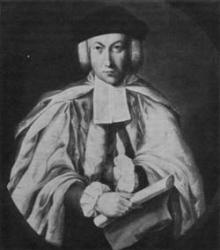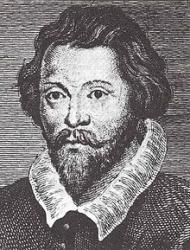Planning worship?
Check out our sister site, ZeteoSearch.org,
for 20+ additional resources related to your search.
- |
User Links
Person Results
Charles John King
1859 - 1934 Person Name: C. King Composer of "[O be joyful in the Lord] (King)" in The Church Hymnal
Charles John King
John Alcock

1715 - 1806 Person Name: John Alcock, 1715-1806 Composer of "[O be joyful in the Lord all ye lands]" in The Church Hymnary (3rd Ed.) John Alcock, doctor of music, was born in London, April 11, 1715; he composed songs, church music, glees, anthems, instrumental music, chantes, etc., and obtained the prize at the Catch Club; died at Lichfield, 1806, aged 91.
A Dictionary of Musical Information by John W. Moore, Boston: Oliver, Ditson & Company, 1876
John Alcock
William Hayes

1706 - 1777 Person Name: W. Hayes Composer of "[O be joyful in the Lord all ye lands: serve the Lord with gladness]" in University Hymns William Hayes (26 January 1708 (baptised) – 27 July 1777) was an English composer, organist, singer and conductor.
Hayes was born in Gloucester. He trained at Gloucester Cathedral and spent the early part of his working life as organist of St Mary’s, Shrewsbury (1729) and Worcester Cathedral (1731). The majority of his career was spent at Oxford where he was appointed organist of Magdalen College in 1734, and established his credentials with the degrees of B.Mus in 1735 and D.Mus in 1749. (He was painted by John Cornish in his doctoral robes around 1749.) In 1741 he was unanimously elected Professor of Music and organist of the University Church. He presided over the city’s concert life for the next 30 years, and was instrumental in the building of the Holywell Music Room in Oxford in 1748, the oldest purpose-built music room in Europe. He was one of the earliest members of the Royal Society of Musicians, and in 1765 was elected a ‘privileged member’ of the Noblemen’s and Gentlemen’s Catch Club. He died in Oxford, aged 69.
William Hayes was an enthusiastic Handelian, and one of the most active conductors of his oratorios and other large-scale works outside London. His wide knowledge of Handel left a strong impression on his own music, but by no means dominated it. As a composer he tended towards genres largely ignored by Handel—English chamber cantatas, organ-accompanied anthems and convivial vocal music—and his vocal works show an English preference for non-da capo aria forms. Hayes also cultivated a self-consciously ‘learned’ polyphonic style (perhaps inspired by his antiquarian interests) which can be seen in his many canons, full-anthems, and the strict fugal movements of his instrumental works. Nevertheless, several of his late trio sonatas show that he was not deaf to newly emerging Classical styles. Although he published virtually none of his instrumental music, his vocal works were extremely popular, and the printed editions were subscribed to by large numbers of amateur and professional musicians. Substantial works like his ode The Passions, the one-act oratorio The Fall of Jericho, and his Six Cantatas demonstrate that Hayes was one of the finest English composers of the eighteenth century.
As a writer, his Art of Composing Music includes the first published description of aleatoric composition—music composed by chance—albeit deliberately satirical in intent. In his Remarks he reveals much about his aesthetic outlook: in particular that he valued the music of Handel and Corelli over that of Rameau, Benedetto Marcello and Geminiani. Finally, the Anecdotes offer insights into the organization of provincial music festivals in the mid-eighteenth century. Hayes bequeathed his important and wide-ranging music library to his son Philip Hayes; the manuscripts of both father and son eventually passed to the Bodleian Library, Oxford, in 1801.
Sacred works
The Fall of Jericho, oratorio, c. 1740–50
Sixteen Psalms (London, 1773)
David, oratorio, completed by Philip Hayes
around 20 anthems and service music, in Cathedral Music in Score, edited by Philip Hayes (Oxford, 1795)
--en.wikipedia.org/wiki
William Hayes
John Robinson
1682 - 1762 Person Name: J. Robinson, 1682-1762 Composer of "[O be joyful in the Lord, all ye lands]" in The Sanctuary Hymnal, published by Order of the General Conference of the United Brethren in Christ
John Robinson
R. A. Atkins
Composer of "[O be joyful in the Lord all ye lands]" in The Book of Common Praise
R. A. Atkins
Thomas Norris
1741 - 1790 Person Name: Thomas Norris Composer of "JUBILATE DEO" in Hymns of the Kingdom of God
Thomas Norris
Bruce E. Ford
b. 1947 Person Name: Bruce E. Ford, b. 1947 Adapter of "[O be joyful in the Lord all ye lands]" in The Hymnal 1982
Bruce E. Ford
William Byrd

1538 - 1623 Person Name: William Byrd (1543-1623) Composer of "[O be joyful in the Lord all ye lands]" in The Hymnbook Byrd, William, one of the "Gentlemen of the Queen's honourable Chappell," son of Thomas Byrd, was born circa 1538, and died in London, July 4, 1623. He was a chorister in St. Paul's Cathedral; Organist of Lincoln Cathedral, 1563-1569; and Gentleman of the Chapel Royal, 1569. He was the composer of several well-known anthems.
--John Julian, Dictionary of Hymnology (1907)
William Byrd
William Turner
1651 - 1740 Person Name: Wm. Turner Composer of "[O be joyful in the Lord all ye lands]" in Church Hymns and Gospel Songs Turner, William; b. 1651; d. 1/13/1740, Engl. composer & singer
William Turner
Robert Prescott Stewart
1825 - 1894 Person Name: Sir R. P. Stewart Composer of "[O be joyful in the LORD all ye lands]" in The Hymnal, Revised and Enlarged, as adopted by the General Convention of the Protestant Episcopal Church in the United States of America in the year of our Lord 1892
Robert Prescott Stewart


 My Starred Hymns
My Starred Hymns


